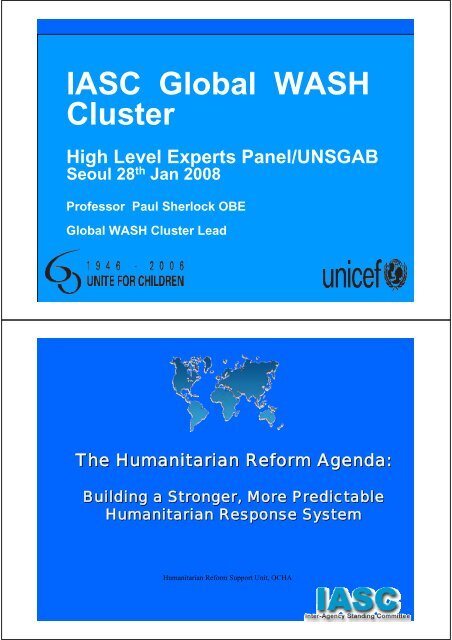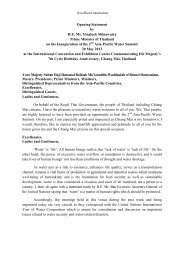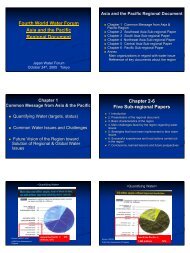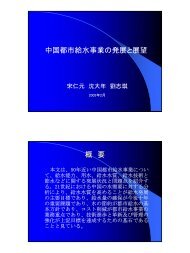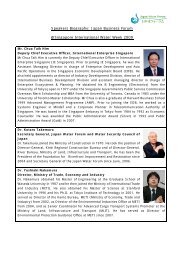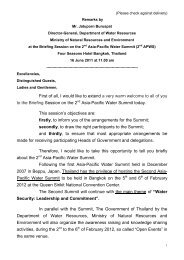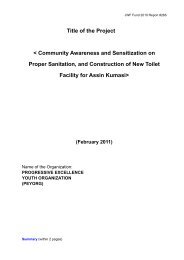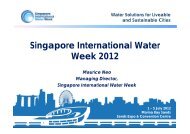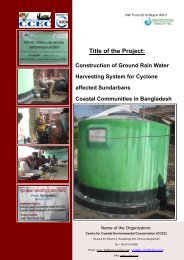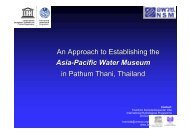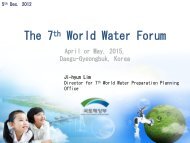IASC Global WASH Cluster
IASC Global WASH Cluster
IASC Global WASH Cluster
You also want an ePaper? Increase the reach of your titles
YUMPU automatically turns print PDFs into web optimized ePapers that Google loves.
<strong>IASC</strong> <strong>Global</strong> <strong>WASH</strong><br />
<strong>Cluster</strong><br />
High Level Experts Panel/UNSGAB<br />
Seoul 28 th Jan 2008<br />
Professor Paul Sherlock OBE<br />
<strong>Global</strong> <strong>WASH</strong> <strong>Cluster</strong> Lead<br />
The Humanitarian Reform Agenda:<br />
Building a Stronger, More Predictable<br />
Humanitarian Response System<br />
Humanitarian Reform Support Unit, OCHA
eform<br />
HUMANITARIAN<br />
Changing Environment for humanitarian operations<br />
• Proliferation of humanitarian actors<br />
• Changing role of the UN (less direct<br />
implementation, more standard-setting and<br />
facilitation)<br />
• Competitive funding environment<br />
• Increased public scrutiny of humanitarian action<br />
reform<br />
HUMANITARIAN<br />
Some Findings from the<br />
2005 Humanitarian Response Review<br />
• “Well-known, long-standing gaps”<br />
• “Limited linkages” between UN and non-UN actors<br />
• Coordination erratic and dependent on personalities<br />
• Insufficient accountability (particularly for IDPs)<br />
• Donor policies inconsistent
Objectives of Humanitarian Reform<br />
1. Sufficient humanitarian response<br />
capacity and enhanced leadership,<br />
accountability and predictability in 9<br />
“gap” sectors/areas of response<br />
2. Adequate, timely and flexible<br />
humanitarian financing<br />
3. Improved humanitarian coordination<br />
and leadership<br />
4. More effective partnerships between<br />
UN and non-UN humanitarian actors<br />
reform<br />
HUMANITARIAN<br />
THREE PILLARS OF REFORM<br />
AND THE FOUNDATION<br />
CLUSTER APPROACH<br />
Adequate capacity and<br />
predictable leadership in all<br />
sectors<br />
HUMANITARIAN<br />
COORDINATORS<br />
Effective leadership and<br />
coordination in<br />
humanitarian emergencies<br />
HUMANITARIAN<br />
FINANCING<br />
Adequate, timely and<br />
flexible financing<br />
PARTNERSHIP<br />
Strong partnerships between UN and non-UN actors
eform<br />
HUMANITARIAN<br />
Inter-Agency Standing Committee<br />
Full Members and Standing Invitees<br />
Whose reform<br />
Full Members<br />
Food and Agricultural<br />
Organisation (FAO)<br />
Standing Invitees<br />
International Committee of the<br />
Red Cross (ICRC)<br />
Office for the Coordination of<br />
International Council of Voluntary<br />
Humanitarian Affairs (OCHA)<br />
Agencies (ICVA)<br />
Inter-Agency Standing<br />
Committee (<strong>IASC</strong>)<br />
United Nations Development<br />
Programme (UNDP)<br />
United Nations Population Fund<br />
(UNFPA)<br />
International Federation of Red<br />
Cross and Red Crescent<br />
Societies (IFRC)<br />
American Council for Voluntary<br />
International Action (InterAction)<br />
United Nations High Comissioner<br />
Composed of NGO consortia, Red<br />
Cross and Red Crescent Movement,<br />
IOM, World bank and UN agencies<br />
for Refugees (UNHCR)<br />
United Nations Children’s Fund<br />
(UNICEF)<br />
World Food Programme (WFP)<br />
International Organisation for<br />
Migration (IOM)<br />
Office of the High Commissioner<br />
for Human Rights (OHCHR)<br />
Office of the Special<br />
Representative of the Secretary<br />
General on the Human Rights of<br />
Internally Displaced Persons<br />
World Health Organisation<br />
(WHO)<br />
(RSG on HR of IDPs)<br />
Steering Committee for<br />
Humanitarian Response (SCHR)<br />
World Bank (World Bank)<br />
reform<br />
HUMANITARIAN<br />
<strong>Global</strong> Capacity-Building<br />
<strong>Cluster</strong>/Sector Working Group<br />
1. Agriculture<br />
2. Camp Coordination & Camp Mgmt<br />
3. Early Recovery<br />
4. Education<br />
5. Emergency Shelter<br />
6. Emergency Telecomms<br />
7. Health<br />
8. Logistics<br />
9. Nutrition<br />
10. Protection<br />
11. Water, Sanitation & Hygiene<br />
<strong>Global</strong> <strong>Cluster</strong> Leads<br />
FAO<br />
UNHCR & IOM<br />
UNDP<br />
UNICEF & Save the Children<br />
UNHCR & IFRC (Convenor)<br />
OCHA (UNICEF & WFP)<br />
WHO<br />
WFP<br />
UNICEF<br />
UNHCR<br />
UNICEF
The <strong>IASC</strong> <strong>WASH</strong> <strong>Cluster</strong><br />
Water,<br />
Sanitation and Hygiene<br />
To ensure:-<br />
<strong>Global</strong> Level Responsibility<br />
• System-wide preparedness<br />
• Technical Capacity<br />
• ensuring greater predictability and<br />
effective inter-agency responses for the<br />
<strong>WASH</strong> sector
Country-Level Responsibility<br />
• strengthen humanitarian response by demanding high<br />
standards of predictability, accountability and partnership<br />
in the <strong>WASH</strong> Sector<br />
• more strategic responses and better prioritisation of<br />
available resources; clarifying the division of labour<br />
among organisations<br />
• providing the Humanitarian Co-ordinator with both a first<br />
point of call and a provider of last resort<br />
• Generic ToR for Country Level <strong>Cluster</strong> Leads<br />
<strong>Global</strong> <strong>WASH</strong> <strong>Cluster</strong> Partners<br />
NGOs<br />
Red Cross<br />
UN<br />
Consortiums<br />
Inst.<br />
Donors<br />
ACF, Oxfam, IRC, WVI, CRS,<br />
Concern, CARE, NCA, Red R<br />
ICMH, IMC MC. Tearfund IR<br />
IFRC, ICRC<br />
UNICEF, WHO, UNEP,<br />
UNHCR, OCHA<br />
SCHR, InterAction,<br />
CDC<br />
OFDA, DFID, ECHO.
GLOBAL WATER, SANITATION HYGIENE (<strong>WASH</strong>) CLUSTER<br />
STRATEGIC FRAMEWORK — 2007/8<br />
<strong>WASH</strong> <strong>Cluster</strong> Goal:<br />
Improve the predictability, timeliness and effectiveness of comprehensive<br />
<strong>WASH</strong> response to humanitarian crises<br />
<strong>WASH</strong> <strong>WASH</strong> STRATEGIC <strong>WASH</strong> STRATEGIC <strong>WASH</strong> STRATEGIC <strong>WASH</strong> STRATEGIC<br />
STRATEGIC Area Area 2 Area 3 Area 4 Area 5<br />
1 Effective and Efficient <strong>WASH</strong> Sector Capacity <strong>WASH</strong> Sector <strong>WASH</strong> Sector Best<br />
Effective <strong>WASH</strong> Information Management for Humanitarian Preparedness Practice and Learning<br />
Sector and Standards Policy Response<br />
OUTPUTS OUTPUTS OUTPUTS OUTPUTS OUTPUTS<br />
1. <strong>Cluster</strong> coordinators 1. Standardised assessment, 1. Hygiene promotion- 1. <strong>Global</strong> and national A. Best Practice:<br />
identified, assessed and gap analysis and coherence, tools, capacity mapping 1. Production and dissemination of<br />
trained and roster of monitoring tools (PROJ 2) guidance, training, frameworks (PROJ 4) <strong>WASH</strong> publication of existing<br />
potential country-level 2. Production, training and resources and mentors 2. <strong>Global</strong> <strong>WASH</strong> equipment<br />
cross-cutting guidance (e.g<br />
coordinators established dissemination of (PROJ 3) stockpile (PROJ 5)<br />
gender, sexual violence, mental<br />
(PROJ 1)<br />
health, HIV/AIDS etc)<br />
information management 2. Training for capacity 3. <strong>WASH</strong> cluster awareness<br />
2. <strong>Cluster</strong> coordination and toolkit (PROJ 2) building- needs 2. Guidance and tools for<br />
workshops (NEW 07/08)<br />
tools for advocacy and<br />
accountability in <strong>WASH</strong><br />
3. Standards policy guidance assessment development<br />
resource mobilisation<br />
4. Interagency <strong>WASH</strong> programming<br />
(NEW 07/08)<br />
and roll out (PROJ 6)<br />
(PROJ 8)<br />
preparedness and<br />
3. Checklists, guidance & best<br />
3. <strong>WASH</strong> cluster agencies<br />
3. Resources for initial<br />
contingency planning<br />
practice for environment &<br />
specific internal capacity<br />
cluster coordination cell<br />
(NEW 07/08)<br />
<strong>WASH</strong>: solid waste management,<br />
building (NEW 07/08)<br />
mobilised (NEW 07/08)<br />
coordinators training and<br />
4. Technical support agencies<br />
4. environment advisor<br />
Evidence based high<br />
level advocacy paper on<br />
for <strong>WASH</strong> response (NEW<br />
4. <strong>WASH</strong> component of HIV/AIDS<br />
integrated <strong>WASH</strong><br />
07/08) emergency guidance<br />
programming (NEW<br />
5. Best practices and guidance for<br />
07/08) special need groups in <strong>WASH</strong><br />
5. Rapid needs assessment<br />
programming<br />
team (NEW 07/08) (ALL NEW 07/08)<br />
6. Dedicated global cluster<br />
advocacy and support B. Learning: (PROJ 7<br />
team and regular global 6. <strong>WASH</strong> cluster field<br />
meetings (CAST)<br />
implementation reviews and<br />
global level evaluations<br />
1. <strong>WASH</strong> <strong>Cluster</strong>/Sector Coordination<br />
1.1 <strong>Global</strong> <strong>Cluster</strong> Advocacy & Support Team<br />
1.2 Training & Roster of country-level Co-ordinators …<br />
1.3 Resources for Initial <strong>Cluster</strong> Co-ordinator Cell **<br />
1.4 Rapid Needs Assessment Team *<br />
1.5 Advocacy & Resource Mobilisation – Tools and<br />
Guidance for <strong>Cluster</strong>s and <strong>Cluster</strong> Co-ordinators
2. Information Management<br />
2.1 Systems and Tools<br />
- Rapid Needs Assessment<br />
- Detailed Needs Assessment<br />
- Who What Where in <strong>WASH</strong><br />
- Gap Analysis<br />
- Monitoring (Benchmarks and Indicators)<br />
- Mapping needs<br />
(Done in co-ordination with OCHA and other clusters)<br />
3. <strong>WASH</strong> <strong>Cluster</strong>/Sector Capacity for<br />
Humanitarian Response<br />
3.1 Hygiene Promotion – coherence, tools, guidance,<br />
training, resources, mentors ,<br />
3.2 Training for Capacity Building – Development and rollout<br />
3.3 Standby Arrangements for accessing Technical<br />
Expertise<br />
3.4 Agency specific capacity building in <strong>WASH</strong><br />
3.5 Technical Support Services.
4. <strong>WASH</strong> <strong>Cluster</strong>/Sector<br />
Preparedness<br />
4.1 <strong>Global</strong> & National Capacity Mapping<br />
Frameworks<br />
4.2 <strong>WASH</strong> <strong>Cluster</strong> Awareness Workshops<br />
4.3 Interagency Preparedness & Contingency<br />
Planning<br />
4.4 <strong>Global</strong> <strong>WASH</strong> Stockpile<br />
5. Best Practice and Learning<br />
5.1 Learning – Reviews of <strong>WASH</strong> cluster implementation<br />
5.2 Cross Cutting Issues Publication for <strong>WASH</strong><br />
5.3 Environment –guidance, tools, Field Advisory Support<br />
5.4 Early Recovery - guidance, tools<br />
5.5 Disaster Risk Reduction - guidance, tools<br />
5.6 Accountability in <strong>WASH</strong> Programming - guidance, tools<br />
5.7 Vulnerable Groups and <strong>WASH</strong> Programming - guidance,<br />
tools (children, older people, disabled)
GLOBAL WATER, SANITATION HYGIENE (<strong>WASH</strong>)<br />
CLUSTER SUPPORT, RESOURCES AND<br />
SERVICES<br />
Access to<br />
cluster<br />
coordinator<br />
Roster<br />
(+resources)<br />
<strong>Global</strong><br />
Contact with Roll out <strong>WASH</strong><br />
global <strong>WASH</strong> <strong>WASH</strong> Hygiene cluster<br />
organisations cluster Promotion awareness<br />
Set-up <strong>Cluster</strong><br />
tools<br />
workshops<br />
support<br />
Support<br />
to the<br />
Field<br />
FOR RESPONSE FOR PREPAREDNESS<br />
Sector<br />
Capacity<br />
Building<br />
Training<br />
Use of Website <strong>WASH</strong> Sector<br />
website for Resources<br />
Capacity Roll out<br />
cluster in Mapping Information<br />
the field Framework Management<br />
tools<br />
Tools and Services<br />
Information Management Best Practice + Guidance Resources + Services<br />
1. Rapid Needs Assessment 1. Disaster Risk Reduction Guidance Note 1. Website<br />
2. Detailed Need Assessment 2. Early Recovery Guidance Note (www.humanitrianreform.org)<br />
3. Who What Where tools 3. Solid Waste Management Guidance Note 2. Sphere project handbook<br />
4. Gap Analysis Tool 4. Environment Guidance Note 3. Technical Support Services<br />
5. Monitoring Tools 5. Accountability in <strong>WASH</strong> programming 4. Environmental Advisors (field)<br />
6. Mapping Capacity 6. Vulnerability and <strong>WASH</strong> response 5. Groundwater Specialists<br />
(elderly, children, disabled)<br />
6. <strong>Cluster</strong> Coordination Training and<br />
7. Mainstreaming Cross-cutting Issues Mentoring<br />
(gender, HIV/AIDS, environment etc)<br />
7.<strong>WASH</strong> Sector Training<br />
8.<strong>Global</strong> Stockpiling<br />
9.Advocacy&Resorce<br />
Mobilisation<br />
Implementation -<br />
The Working Group Approach<br />
• Different agencies have specific strengths which have<br />
huge value and contribution to make in developing the<br />
sector globally – there is a desire to harness these<br />
strengths for the sector as a whole<br />
• The strengths of all different agencies together are much<br />
greater than the capacity of any one agency<br />
• <strong>Cluster</strong> lead has responsibilities and accountabilities –<br />
but these can only be achieved by working together<br />
• Implementation supported by the <strong>Cluster</strong> Support Team<br />
– ensuring it happens
Linking with Other <strong>Cluster</strong>s<br />
• Camp Co-ordination and Camp Management –<br />
Developing MoU on roles of each cluster in camps<br />
• Shelter – NFI responsibility; ensuring <strong>WASH</strong> facilities<br />
integrated into shelter in emergencies/recovery<br />
• Developing MoU with UNHCR for Refugee Situations<br />
• Nutrition & Health – potentially on inter-sectoral needs<br />
assessment.<br />
• Meeting of <strong>Cluster</strong> leads for Health, Nutrition, <strong>WASH</strong><br />
…Planned joint meeting 2007<br />
New <strong>Global</strong> <strong>WASH</strong> <strong>Cluster</strong><br />
Workplan 2007<br />
• Continue the implementation of projects defined in 2006<br />
• Roll out of the products of the projects<br />
• New suggestions<br />
– Permanent response team<br />
– National staff training focus<br />
– Real time evaluations<br />
– Disaster Risk Reduction<br />
– Guidance on cross cutting issues<br />
– Increase advocacy role of cluster support team<br />
– Increased inter-cluster co-ordination<br />
– Emergency Waste Management Guidelines<br />
– Internal agency capacity building
Thank you


